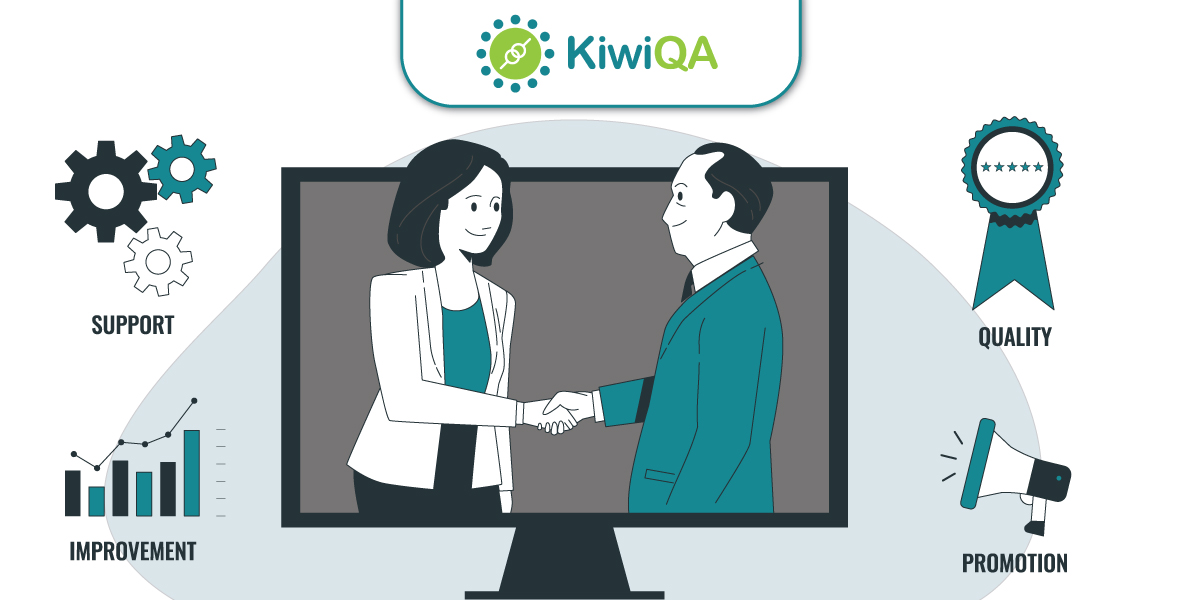All You Need To Know About CRM Testing

 KiwiQA
KiwiQABuilding a long-lasting customer relationship has become extremely important in today’s competitive times. With the widespread use of the internet, existing as well as potential customers can reach out to the company via different mediums like chat, call, email, and more. This is why CRM (Customer Relationship Management) is important for building rapport (or relationship) with the customers.
Efficient use of CRM helps in smooth customer onboarding, customer acquisition, and customer retention. Irrespective of the size or scale of the business, CRM must be leveraged for business growth as well as survival. It is no surprise that CRM softwares holds a lion’s share in the overall software market1.
Having said that, issues in the CRM software can lead to a bad user experience. It can also result in loss of leads – a vital factor that can slow down the growth of the business. Faulty CRM solutions and long response times can be a huge turn-off for your current (and potentia) customers. An outsourced QA vendor that has expertise in providing CRM testing services can help businesses in the long run.
In this blog, we will touch upon the integral aspects of CRM testing, the learnings of which will be useful in building a top-notch CRM testing strategy.
Like any other form of software testing, CRM testing is also used for verifying the software functionalities from a business standpoint. CRM testing encompasses rigorous testing of the CRM system from the following aspects:
By the end of CRM testing cycles; developers, CRM consultants, and clients have an understanding about the overall quality of the CRM system. The results will unearth whether the system delivers results aligned to the business objectives.
Salesforce, Zoho, Freshdesk, etc. are some of the prominent CRM softwares used by a range of businesses. CRM testing must be considered a top priority, else a bad end-user experience might result in loss of sales!
Also Read – Beginners Guide to SalesForce CRM Testing
It is important that enterprises (or companies) prioritize CRM system testing since it has a significant impact on the business goals. A comprehensive CRM system testing plan must be built on the following principles:
The CRM system must be tested against different forms of data that are relevant to the system. To reap the best results, it is essential to test the robustness of the system by taking different forms of input data into consideration.
Irrespective of whether you are using a manual or automated approach, make sure that the system is tested against unique data inputs.
Almost all the CRM softwares support role-based permissions. Roles help in ensuring that only members with the necessary permissions can access the required modules in the system.
RBAC (Role-based Access Control) replicates the organization’s hierarchy, thereby helping test the CRM system from a security standpoint.
Data is an integral part of any CRM system. Hence, data quality must be considered a top priority for CRM testing. As far as quality of data is concerned, it is important to focus on missing data points, duplicate records, stale data, etc.
To ensure that the CRM testing is covered from all angles, data testing must encompass manual data entry as well as data taken into consideration from data warehouses, data applications, and more.
Since every CRM system gives the provision of creating custom fields (e.g. Salesforce CRM), you should give utmost attention when considering CRM system migration.
Along with keeping the quality of data intact, it is important to perform UI (os usability) testing of the front-end of the CRM system. Issues in the CRM’s front-end might result in choking up the speed at which the feedback can be delivered for business analysis.
Since the CRM system is an integral part of customer acquisition and retention, the dashboard and reporting features must be tested in a thorough manner. Many CRM systems are now either completely on the cloud or follow a hybrid model. In such a case, the CRM system can be accessed from any browser or operating system. Cross browser testing and/or cross platform testing must be considered for CRM testing on the cloud.
Since the target customers (or clients) might also access the CRM system on their preferred mobile devices, mobile testing of CRM systems must be considered on priority. Such a strategy will help in providing a fully-functional and highly usable CRM system to the target users (or customers).
As mentioned earlier, CRM systems are used for lead generation, customer retention, and customer acquisition. This means that the data in the CRM will be used by personnel from different departments (e.g. pre-sales, sales, business development, churn & retention, etc.).
Relevant data points must be available for access to the team members in different teams (e.g. marketing teams using the CRM system must have detailed insights into the marketing budget, active campaigns, email CTR (Click Through Rates), social media effectiveness, and more.
On the other hand, the customer service department must have information about the customer queries, ticket status, ticket priorities, and more.
In a nutshell, the functionalities and workflows must be tested thoroughly to make sure that there is seamless operation for the selected personnel in various departments.
Apart from the pointers mentioned above; security testing, performance testing, and integration testing must also be considered in the CRM testing plan. Opting for CRM testing services is a good option to expedite the testing of CRM systems. Such a partnership is particularly useful in scenarios where the inhouse team does not have expertise in performing CRM testing at scale.
Also Read – Checklist for Effective Website Testing
Now that I have touched upon the essentials of CRM testing, let me deep dive into the key KPIs (Key Performance Indicators) that are associated with CRM testing.
Like the other forms of testing, the test plan must include test scenarios that cover all the requirements of the CRM system. Lower test coverage could be detrimental to the product quality.
There should be no missing requirements and there must be a clear mapping of the test scenarios with the feature requirements.
There might be cases where certain requirements are missed out in the overall test plan. This could lead to buggy software making way into the CRM system.
Timely analysis must be done to ensure that tests are associated with requirements and relevant details are available about their execution status (i.e. release on which the tests were last executed, etc).
It goes without saying that manual testing must be accompanied with automated CRM testing. To make the most out of automated CRM testing, companies must make CRM automation tests a regular feature in the CI/CD (or Continuous Integration) pipeline.
Manual CRM testing can be leveraged in cases where the automation testing makes little (to no sense). In short, manual CRM tests must be considered when any human intervention is necessary for running the tests.
CRM testing must be given equal priority as CRM system development. When running tests on CRM, its performance, functionality, security, and usability must be taken into consideration.
Untested or partially tested code in the CRM system not only leads to bugs but might also clog your customer (or lead) acquisition pipeline. It is recommended to onboard a reliable and experienced outsourced QA vendor in scenarios where the internal QA team does not expertise in CRM testing.
KiwiQA has a dedicated team of CRM testers that have helped large-scale enterprises in verifying every aspect of the CRM system. Such an approach will reap immense benefits in the short term as well as long term.
Subscribe to our newsletter for some hand-picked insights and trends! Join our community and be the first to know about what's exciting in software testing.
Welcome to the testing tales that explore the depths of software quality assurance. Find valuable insights, industry trends, and best practices for professionals and enthusiasts.

Fill out and submit the form below, we will get back to you with a plan.
 CRN:
22318-Q15-001
CRN:
22318-Q15-001 CRN:22318-ISN-001
CRN:22318-ISN-001 CRN:22318-IST-001
CRN:22318-IST-001